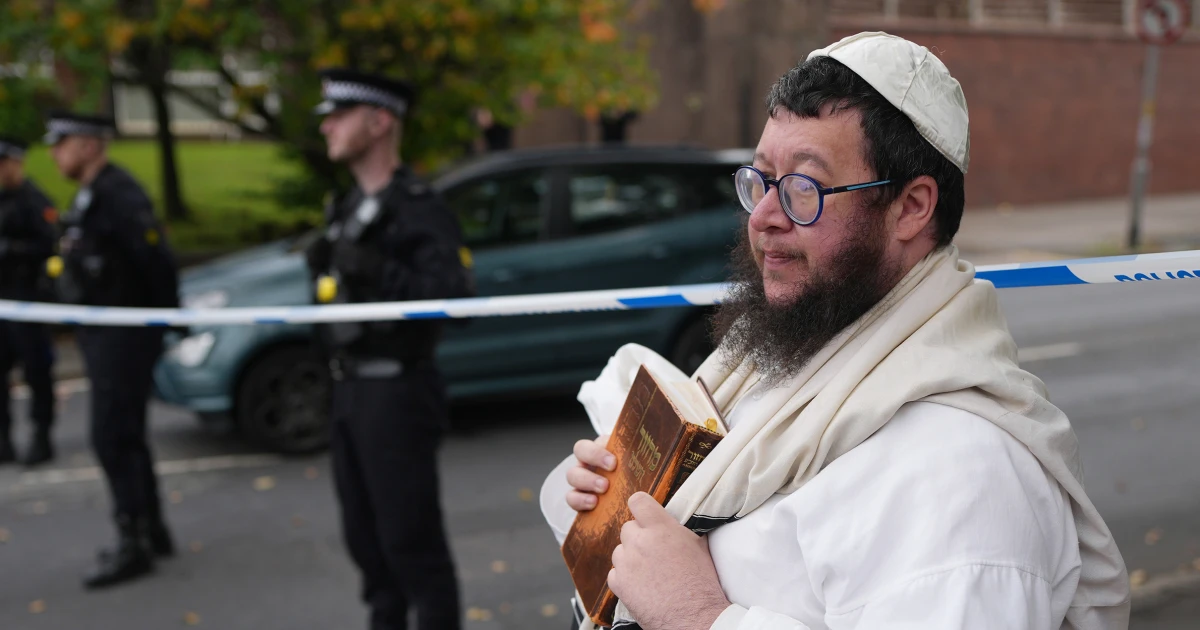
MANCHESTER, England — British Prime Minister Keir Starmer said he was shocked by Thursday’s terrorist attack on a Manchester synagogue during Yom Kippur, the holiest day in the Hebrew calendar.
But for many British Jews, this was anything but a shock, rather the culmination of a wave of antisemitism in Britain that was rising before Hamas’ terrorist attack Oct. 7, 2023, and Israel’s subsequent military assault on Gaza — and has only intensified since.
There has been a rise in anti-Jewish hostility in Britain that predates the attack in Israel and the Gaza war that started three years ago, according to community groups and the people suffering the first-hand effects in the United Kingdom. But the incident at the Heaton Park Hebrew Congregation Synagogue in Crumpsall has brought the issue of antisemitism to the fore again — leaving many Jewish people in Britain worried for the safety of their friends and family.
“I just keep thinking about my children,” said Josh Simons, a member of Parliament who represents the Makerfield constituency near Manchester, and whose family fled persecution in Europe for the relative safety of England around a century ago. “I’ve got two young kids and I think everybody in this community will be holding their children tonight that little bit closer.”
He told NBC News on Thursday that the community was feeling “frightened, scared and hurt.”
Two men, Adrian Daulby, 53, and Melvin Cravitz, 66, were killed during the attack on the synagogue.
Greater Manchester Police said Friday that one of them suffered a wound as armed officers attempted to shoot the attacker, Jihad Al-Shamie, who drove into a group of people before stabbing a man. Al-Shamie did not have a firearm. But for many in the Jewish community the attack, which also left three people injured, was the culmination of something that had been festering for some time.
“This is the day we hoped we would never see, but which deep down, we knew would come,” Britain’s chief rabbi, Ephraim Mirvis, also said in a statement. “For so long we have witnessed an unrelenting wave of Jew hatred on our streets, on campuses, on social media and elsewhere — this is the tragic result,” he added.
Since Israel launched its military offensive in the wake of the Hamas-led terrorist attacks on the country, there has been a spike in antisemitic incidents in Britain, according to the Community Security Trust, a charity that coordinates security measures at Jewish institutions and tracks this data. The group defines antisemitism as “hatred, bigotry, prejudice or discrimination against Jews,” on its website.
That year, 2023, saw 4,103 antisemitic incidents reported to the CST — the most on record — and last year’s 3,528 was the second highest. Swastikas and other graffiti have been daubed on synagogues and other sites, and security has been heightened at Jewish schools.
In the space of a week last month, urine and feces were smeared over seven synagogues and a children’s nursery in Golders Green, a part of north London known for its large Jewish population. “These repeated attacks have left our community anxious, hurt and increasingly worried,” a spokesperson for the local Shomrim community Jewish patrol group said at the time.
In May, a Jewish-owned business in nearby Stamford Hill, which has a large Orthodox Jewish community, was daubed in red paint and had its windows smashed. Graffiti alleged the firm had links to an Israeli arms manufacturer, but traumatized staff there said this wasn’t the case.
“There is no doubt that the number of attacks has increased since the Gaza conflict,” Graham Stringer, another member of Parliament serving Blackley and Middleton, another constituency close to Manchester, said in an interview Friday. “The Jewish community has been angry and frightened and so, incidentally, has the Muslim community.”
There was an increase in religious hate crimes targeted against Muslims since the beginning of the Israel-Hamas conflict, with 3,866 offenses in the year leading up to March 2024, according to the latest government data. This was up 13% from 3,432 recorded the previous year, the data showed.
Perhaps this is why the 2025 Jewish Landscape Report, an annual global survey, found that 81% of respondents in Britain felt the need to conceal their Jewishness in public.
In a febrile atmosphere, Starmer is now under pressure to reassure British Jews — who make up just 290,000 of Britain’s 70-million population, according to the last census in 2021 — that they are safe.
He said Thursday he would do “everything in my power to guarantee you the security that you deserve, starting with a more visible police presence, protecting your community.”
The necessity of that was evident hours after the incident in Manchester, when two cars drove past the scene displaying Palestinian flags, while some men in balaclavas could be heard muttering about “Jews”, according to a Reuters journalist at the scene.
Other observers were dismayed to see pro-Palestinian marches going ahead Thursday evening in Manchester, London and other cities.
There have been regular marches and protests in cities across the country about Israel’s conduct during the war, which will enter its third year Tuesday. Among the crowds, which have on occasion contained tens of thousands, there have been displays of violent antisemitic sentiment, as well as language that conflates enmity toward Israel, Zionism and Jews themselves.
On Friday, protesters said they were supporting an urgent cause, specifically the aid flotilla that was intercepted by the Israeli military en route to Gaza.
But for others — both in and outside the Jewish community — it was disappointing not to have a pause in the demonstrations that have often been interpreted as hostile by British Jews.
“I do think that carrying on in this way does feel un-British, it feels wrong,” Home Secretary Shabana Mahmood told the BBC. “It is important to draw a line between what is happening in the Middle East and what is happening at home.”



